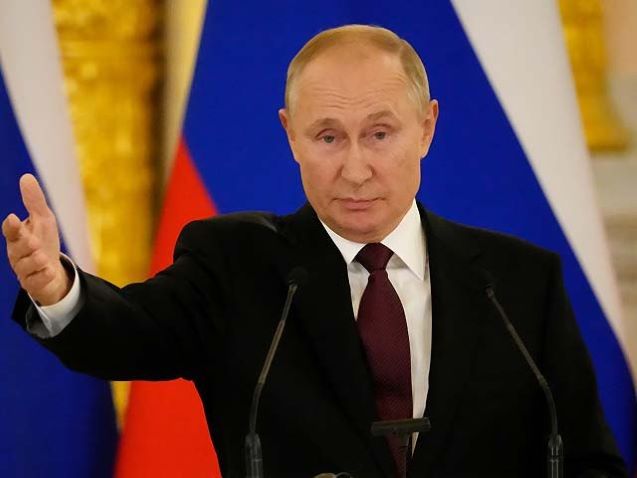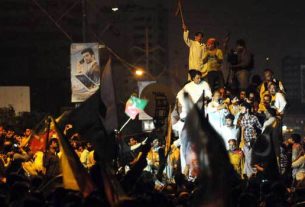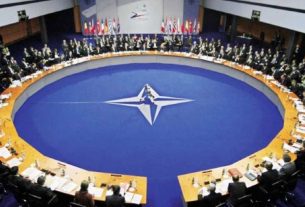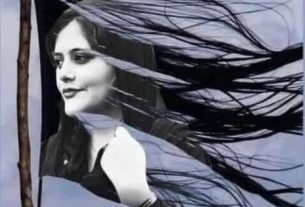Vladimir Putin was always going to claim his fifth term as president with a landslide, faced with three other candidates all rubber-stamped by the Kremlin.
But when election officials said results gave him more than 87% of the vote, he said Russia’s democracy was more transparent than many in the West.
In truth no credible opposition candidate was allowed to stand.
Supporters of dead Putin critic Alexei Navalny did stage symbolic protests.
Their “Noon against Putin” initiative meant that long queues of voters turned out in Russian cities including Moscow and St Petersburg and outside many embassies abroad, but it was never going to have any impact on the result.
Monitoring group OVD-Info said at least 80 Russians were arrested. There was no repeat of the sporadic attacks on some polling stations that happened on Friday.
Western countries lined up to condemn the vote as neither free nor fair.
Germany called it a “pseudo-election” under an authoritarian ruler reliant on censorship, repression and violence.
UK Foreign Secretary Lord Cameron condemned “the illegal holding of elections on Ukrainian territory”.
Ukraine’s President Volodymyr Zelensky said “the Russian dictator is simulating another election”.
In the words of Navalny ally Leonid Volkov, savagely beaten with a meat hammer in exile in Lithuania last week: “The percentages drawn for Putin have, of course, not the slightest relation to reality.”
Russians had three days to vote and people in Russian-occupied areas of Ukraine had even longer, in an attempt to persuade residents to take part.
One election commission official was reported killed in the occupied town of Berdyansk on Sunday and residents spoke of pro-Russian collaborators going from home to home with ballot boxes accompanied by armed soldiers.
But on Russia’s carefully controlled state TV channels the result was hailed as a triumph.
“This is an incredible level of support and unity around the figure of Vladimir Putin,” said one correspondent excitedly, “and a signal to Western countries”.
President Putin was more subdued as he took questions from reporters, but he did hail Russia’s presidential campaign as far more advanced than the US, citing Russia’s use of online voting, which officials said brought in eight million voters.
Mr Putin had earlier been filmed performing a single keystroke to exercise his democratic right.
“It’s transparent and absolutely objective,” he suggested, “not like in the US with mail-in voting… you can buy a vote for $10”.
He is now set to stay in power until at least 2030, and has ruled Russia since 2000 – the longest-serving Kremlin leader since Soviet dictator Joseph Stalin.
Independent watchdog Golos was barred from observing the vote but reports of irregularities have emerged, as well as pressure on public sector employees to vote either in polling stations or online.
President Putin praised opposition campaigners for encouraging voters to turn out in greater numbers, although he condemned those who spoilt their ballots and said action would be taken against them.
For the first time he referred to Alexei Navalny by name, a month after his most vocal critic died in a penal colony inside the Arctic Circle.
In a remark possibly aimed at rebutting widespread allegations that he had Navalny killed, Mr Putin confirmed reports that he had explored exchanging him for prisoners held in the West, but on the condition that his rival never returned.
“I said I’m for it but, unfortunately, what happened happened. What can you do? That’s life.”
Yulia Navalnaya described queuing for six hours outside the Russian embassy in Berlin as part of the protest vote campaign. She said she had written her late husband’s name on her ballot paper, and praised everyone who turned up, for giving her “hope that everything is not in vain”.
One protest voter in London said she had queued for more than seven hours before casting her ballot.
Activist and lawyer Lyubov Sobol said in Washington DC that the protest votes would not be reflected in the Kremlin’s results, “but this solidarity, this symbol, is nonetheless important”.
Russia’s presidential election was never going to be a level playing field. The Kremlin tightly controls the political system, the media and elections.
Communist Party candidate Nikolai Kharitonov managed little more than 4% of the vote and his fellow candidates even less.
None of the three were serious candidates and Mr Kharitonov even praised the president ahead of the election for “trying to consolidate the nation for victory in all areas”.
Millions of Russians will have voted for a fifth Putin presidential term partly because they see no credible alternative.
But that is purely because the Kremlin has removed any possible challenger from the political landscape. Opponents have either been jailed, or they have fled into exile, or they have lost their lives.
For a few short weeks there was a suggestion that an anti-war politician called Boris Nadezhdin might be allowed to stand. But last month he was ruled out by the election commission as increasing numbers of Russians warmed to his message and queued to register their support.__BBC.com





